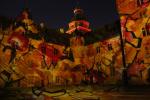Renaissance
The Renaissance was a cultural movement and time period in the History of Europe, considered to mark the end of the Middle Ages. The Renaissance is usually considered to have begun in the 14th century in Italy and the 16th century in northern Europe. It is also known as "Rinascimento" (in Italian).
"Renaissance" is a French word coined by French historian Jules Michelet and expanded upon by Swiss historian Jacob Burckhardt in the 19th century that literally means rebirth. This name has been historically used in contrast to the Dark Ages, a term coined by Petrarch to refer to what we now call the Middle Ages. Following Petrarch's lead, the term had long been considered appropriate because during the Renaissance, the literature and culture of the ancient civilizations of Greece and Rome were adopted by scholars and artists in Italy, and widely disseminated through printing. During the last quarter of the 20th century, however, more and more scholars began to take a view that the Renaissance was perhaps only one of many such movements. This was in large part due to the work of historians like Charles H. Haskins, who made convincing cases for a "Renaissance of the 12th century," as well as by historians arguing for a "Carolingian renaissance." Both of these concepts are now accepted by the scholarly community at large; as a result, the present trend among historians is to discuss each so-called renaissance in more particular terms, e.g., the Italian Renaissance, the English Renaissance, etc. This terminology is particularly useful because it eliminates the need for fitting "The renaissance" into a chronology that previously held that it was preceded by the Middle Ages and followed by the Reformation, which was sometimes patently false. The entire period is now more often replaced by the term 'Early Modern' in the practice of historians. [Souce: Wikipedia]









































































































































